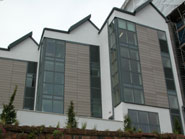Professor Jenny Donovan, Head of the Department of Social Medicine said: “We are absolutely delighted with the new extension to Canynge Hall, funded by the University of Bristol and the Wolfson Foundation. The extension will greatly enhance our research and teaching capacities by providing state-of-the-art teaching facilities and high quality meeting and office accommodation.
“The extension is to be opened by Professor Stephen Frankel, Head of Department 1992-2004, and Mr Ray Bartlett, Senior Porter, in a simple ceremony followed by the inaugural annual Stephen Frankel Lecture, delivered by Professor Ezra Susser of Columbia University, New York.”
The £4.1million project was initiated early in 2005 and commenced on site in November 2006. The extension was designed by NVB Architects and built by the construction company Leadbitter.
The project is located in the Whiteladies Road Conservation Area between the existing Canynge Hall building constructed in 1880, Victorian terrace houses and the Clifton Down railway station. This sensitive location required careful detailing of the building to respond to the context of the site in terms of scale and use of materials. It also required the construction to be sensitive to the existing occupants of Canynge Hall and the adjacent properties.
The building has been carefully designed to facilitate energy conservation by the use of natural ventilation, the thermal mass of the structure and the maximum use of natural light.
Bristol’s Department of Social Medicine is a leading centre for research and teaching in epidemiology, public health and health services research. It was awarded the top 6* grade in the 2001 Research Assessment Exercise.
The Department has won major grants for research into many public health issues including prostate cancer (£36 million); antiretroviral therapy and HIV (£627,144); molecular, genetic and lifecourse epidemiology (£2 million), suicide prevention (£898,000), and breast feeding promotion ($746,541).
Over the years, cutting edge research from the Department has been published in major national and international journals including the BMJ and The Lancet. Recently published studies have examined what doctors tell cancer patients about the benefits and risks of chemotherapy; how antiretroviral therapy has increased life expectancy in HIV-positive patients; and how smoking rates among teenagers can be reduced by training influential pupils to promote anti-smoking messages.
The Department houses the MRC Centre for Causal Analyses in Translational Epidemiology (CAiTE); the premier birth cohort study, ALSPAC (Avon Longitudinal Study of Parents and Children); an NHS R&D Academic Support Unit; and (jointly with Primary Care) the Bristol Randomised Trials Collaboration, a UKCRC/NCRI-accredited trials unit.
